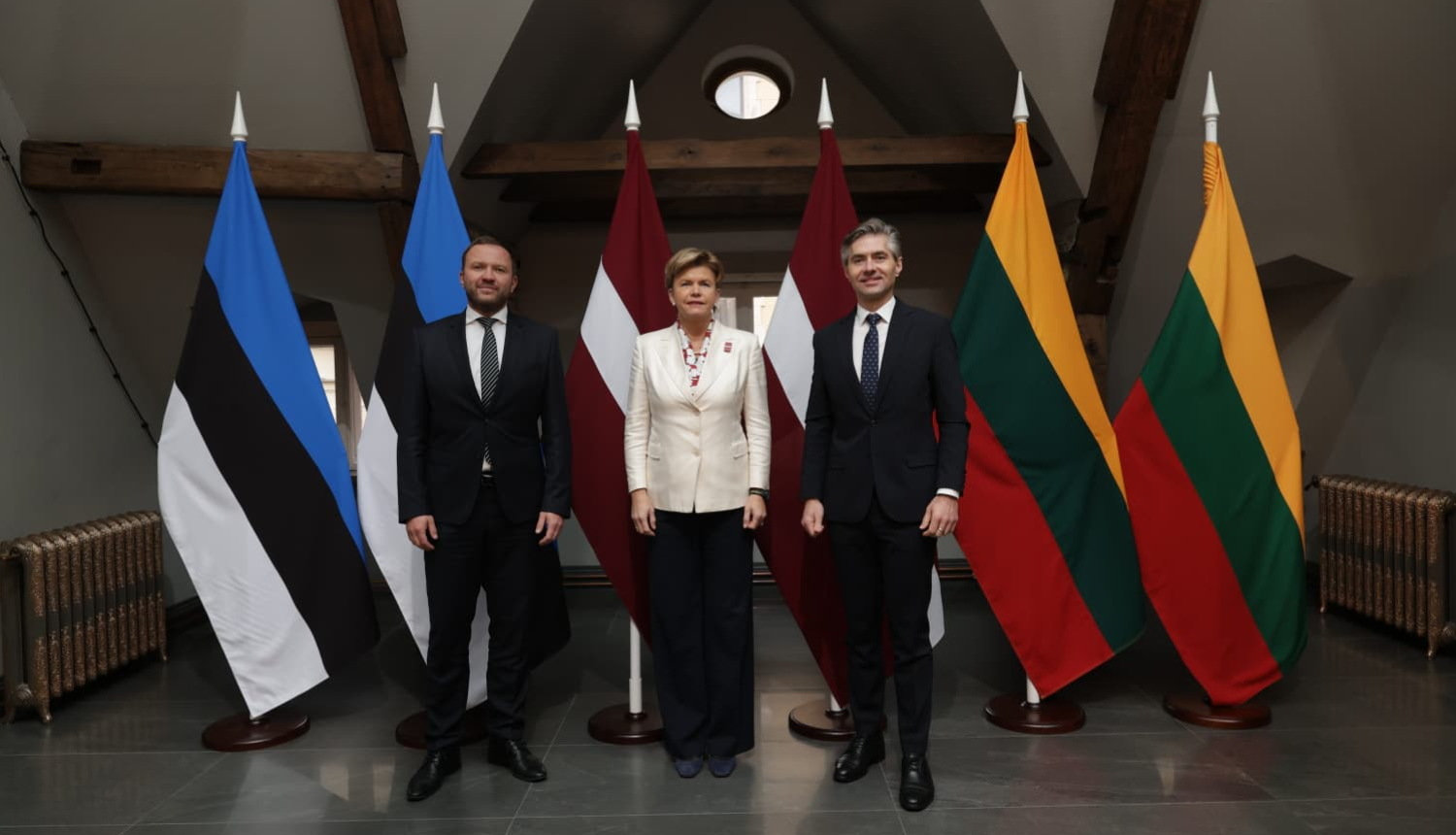On 14 November 2025, the Minister of Foreign Affairs of Latvia, Baiba Braže, welcomed her Baltic counterparts – the Minister of Foreign Affairs of Estonia, Margus Tsahkna, and the Minister of Foreign Affairs of Lithuania, Kęstutis Budrys – to Riga. The ministers had a discussion about the Baltic States’ trilateral cooperation, transatlantic relations, the security situation on the eastern flank, including strengthening the security of the Baltic Sea and the EU and NATO external borders, support to Ukraine and constraining Russia, including through the upcoming 20th package of sanctions, as well as the EU’s Multiannual Financial Framework.
The Ministers met during the 31st Baltic Council. At the conclusion of the event, the President of the Baltic Assembly, Jānis Vucāns, and the Minister of Foreign Affairs, Baiba Braže, signed a Joint Statement on the work accomplished in Baltic states’ cooperation over the present year and the matters of priority for next year.
Foreign Minister Baiba Braže:
“I am truly happy to welcome my Baltic brothers – Margus and Kęstutis, the Foreign Ministers of Estonia and Lithuania – to Riga today. The annual Baltic Council is an opportunity to coordinate cooperation at the level of ministries and parliaments in our common priority areas – defence and security, as well as economic development. The primary task for the Baltic states is to further strengthen their defence and deterrence capabilities, support Ukraine, and weaken Russia. And we are leaders in NATO in this regard – next year, the Baltic states will reach the defence spending target of 5% of GDP set in The Hague. It is our countries that are the first line of security – standing together, we guard the external border of the EU and NATO, investing significant funds both in the strengthening of infrastructure and in human resources. It is here that the border is guarded on a daily basis, fighting against Russian hybrid threats – the instrumentalization of migration, as well as enforcing EU sanctions and preventing their circumvention.”
We are also working together on active transatlantic diplomacy, joint lobbying in the U.S. Congress to ensure continued support for the Baltic Security Initiative, military assistance, joint exercises, and strengthening the security of the eastern flank. We are valued, and, quoting members of the U.S. administration, the Baltic states are exemplary allies.
The Ministers welcomed their countries’ cooperation in cultural diplomacy, highlighting the fact that this year, the Languages Award bestowed by the Latvian and Estonian Ministries of Foreign Affairs was presented for the 16th time, while the Balts’ Award by the Latvian and Lithuanian Ministries of Foreign Affairs saw its 8th edition.
The ministers agreed that the historical goals of Baltic cooperation – breaking away from Russia’s sphere of influence, strengthening statehood, and joining the EU and NATO – have been achieved. Our focus now is on helping Ukraine, weakening Russia until it ends its war against Ukraine, strengthening the security and economic development of the Baltic region, and enhancing the Baltic role and defending its interests in various international formats.
The Baltic foreign ministers participated in the 31st Baltic Council to discuss topical issues in Baltic cooperation with the members of the Baltic Assembly. The Latvian Foreign Minister informed about the achievements during the Latvian presidency, emphasizing that this year saw the historic disconnection of the Baltic States from the Russian electricity grid and their connection to the Continental European grid, which is a fundamental contribution to Europe's common security.
The Estonian Foreign Minister, Margus Tsahkna, introduced those present to the priorities set by Estonia for its Baltic Council of Ministers (BCM) Presidency in 2026: regional security, including food security and resilience of supply chains; cross-border connectivity, including Rail Baltica and protection of critical infrastructure; and comprehensive and continued support to Ukraine at all levels.
The 32nd Baltic Council will meet in Tallinn on 23 October 2026.
Background information
- The Baltic Council of Ministers (BCM) is a co-operation institution of the governments of Latvia, Lithuania and Estonia, established on 13 June 1994. The task of the BCM is to ensure the continuity of co-operation at the level of national executive authorities. The BCM presidency is rotated annually among the Baltic States.
- The Baltic Council is a joint meeting of the Baltic Assembly and the BCM Co-operation Council, at which the Chairman of the Co-operation Council (Foreign Minister of the chairing country) presents an overview of what has been accomplished during the year. For their part, the Foreign Minister of the incoming presidency outlines its priorities and plans, which are then included in the Joint Statement of the Baltic Council.
- The Baltic Assembly (BA) is an inter-parliamentary institution of Latvia, Estonia and Lithuania established on 8 November 1991.




